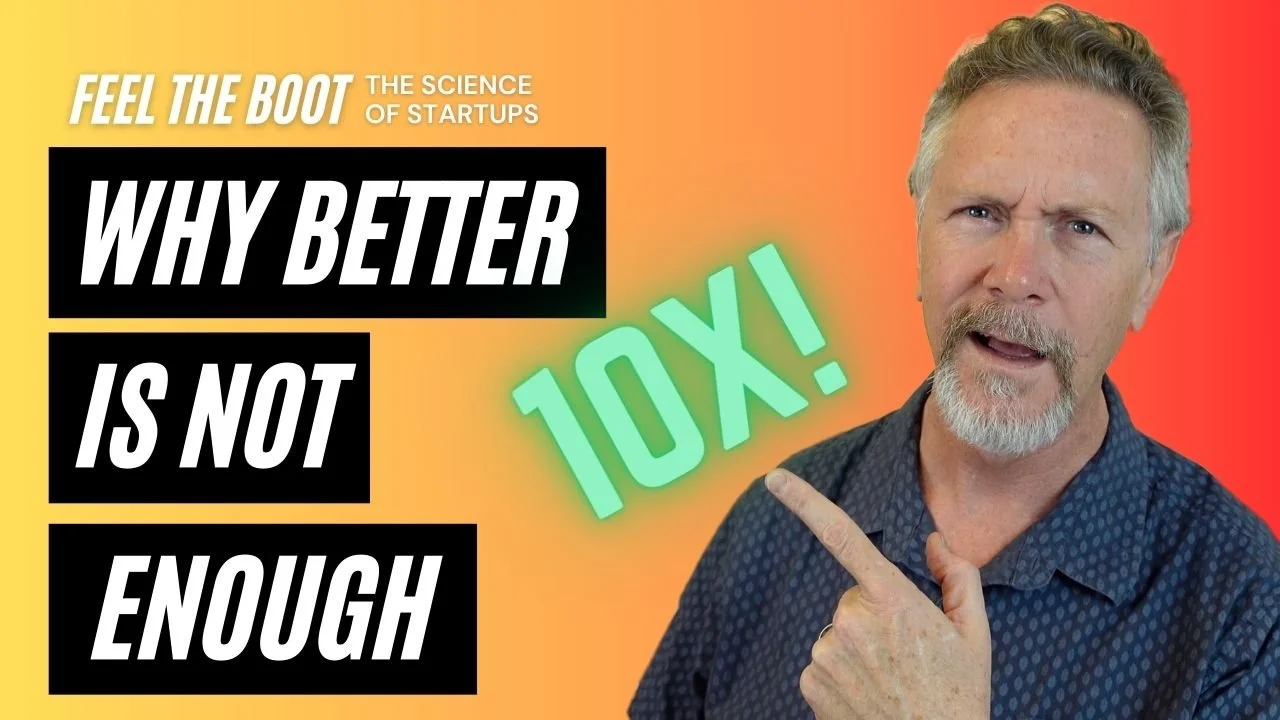99. The 10x rule 🌟 Why better is not enough
Video Version of this article
Investors and advisors may have told you your solution needs to be ten times better, faster, or cheaper than the competition.
But why is that?
I want to unpack why that's not just an investor demand but the key to your startup's success.
This article is part of our series on startup insights. This is where we share the things nobody tells you about the process of launching and running startups. You can find all the other articles HERE
If you're a founder, you provide a solution for your customers. For the sake of argument, let's assume it is superior to the alternatives.
Isn't that enough?
No.
The reason just being better is insufficient lies in the intersection of the reality of startups and customer decision-making (particularly for businesses).
Obviously, the 10x number is arbitrary, but it's a nice round number that helps make a point. It's not enough to be a little bit better than your competition. Being 10% cheaper, faster, or better won't win you any sales. You need to be a tremendous improvement over them in some way.
Switching Costs
Your first problem is switching costs.
The cost of adopting your solution might not be only, or even primarily, your price. It takes time and effort to switch between solutions. Often, a great deal of effort.
They must migrate data, replace incompatible software, train users, etc.
Your customer knows that, if your solution does not work out, they will need to do all that again.
As a result, most businesses are hesitant to switch to new solutions unless the benefit far exceeds the direct and indirect switching costs.
Immature Solution
As a startup, your solution is probably still in rough shape. It might deliver on its core value proposition, but the documentation, UI/UX, onboarding, and other aspects likely still need significant work.
However, the solution from your big established competitors probably has all that squared away. The solutions are polished and refined after years of customer feedback.
Your job as founder is to convince them to move from that beautiful, robust, but somewhat lacking solution to adopt your ugly duckling for the additional benefits it provides.
Your potential customers are unlikely to embrace your offer in exchange for a marginal improvement.
To convince them to deal with a clunky interface, buggy code, and constant updates, your benefits need to rock their world.
This is why so many startups' main competition is Excel. While their SaaS tools might be more sophisticated and specialized, Excel is ubiquitous, stable, flexible, and everyone already knows how to use it.
Startup Failure
It's a sad reality that most startups fail within a few years. Who wants to adopt a solution that has an 80% chance of disappearing when the startup pivots or folds?
Anyone buying your product knows they will probably need to switch again fairly soon.
People often lose their jobs over decisions like that.
Why would anyone do that?
The only reason is that the upside of taking the risk far exceeds the cost of failure.
This is where the 10x better, faster, cheaper comes in.
Your solution needs to be so amazing that, even if you collapse in eighteen months, nobody will question the decision to buy from you.
The purchaser can look everyone in the eye and say, "Considering the massive advantages we gained from adopting this solution, it was obviously worth it, even if we only used it for a short time."
If you were just 10% better, everyone in the company would tell the buyer, "You idiot! You cost us $10 million in switching costs for $1 million in benefits!"
Nobody in their right mind would risk that result.
So, ensure your potential customers perceive your solution as utterly game-changing before selling them.
If you found this useful, you might want to look at this article next. In it, I discuss how to talk to potential customers to understand their needs and priorities to ensure the solution you build will pass the 10x test.

